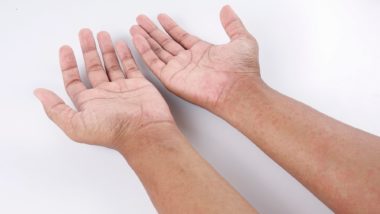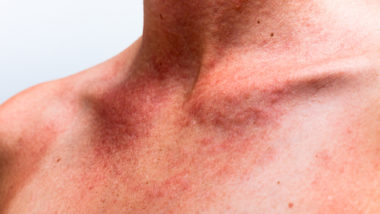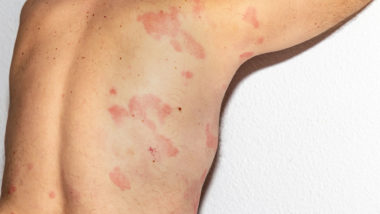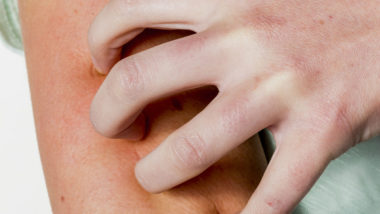
According to some reports from consumers who have taken over the counter medications, some over the counter drugs may be capable of causing Stevens-Johnson Syndrome, a rare and serious allergic reaction.
What is Over the Counter Medicine?
Over the counter medications are drugs that may be purchased without a prescription from a doctor. Common types of OTC medications include antacids, pain relievers, fever reducers, anti-diarrheal or gas medication, and allergy medications. These over the counter drugs have been deemed to be safe for usage without a prescription or direct doctor supervision, as long as the instructions on the label are followed correctly.
The labels on over the counter medications generally contain information regarding what the drug is meant to treat, dosage level and frequency, potential side effects, and any conditions that might cause the drug to affect the patient negatively.
Although most over the counter medications are safe for consumer use, some of these drugs have been linked to dangerous health conditions including Stevens-Johnson syndrome (SJS).
What is Stevens-Johnson Syndrome?
Stevens-Johnson Syndrome, or SJS, is a serious medical condition that can be caused by an adverse reaction to a medication. The condition affects the skin, as well as mucus membranes including the eyes and mouth. SJS usually presents initially like the flu, then as a red or purple rash that quickly spreads across the body. This rash may cause the top layer of skin to erupt into lesions, or peel away.
The skin conditions caused by Stevens-Johnson Syndrome are often serious enough to require treatment in a hospital burn unit, where skin grafts or other burn treatments may be necessary. Many people who recover from the condition may be left with lasting injuries or scars.
It is the risk of infection that is most dangerous. For patients whose Stevens-Johnson related skin conditions cover less than 30 percent of their skin, there is a 5 to 15 percent chance of death. Once the allergic condition has progressed to cover more than 30 percent of their skin, the ailment is referred to as toxic epidermal necrolysis, or TEN. With TEN, the chance of death may be as high as 40 percent.
Unfortunately, there are no treatments known that can help heal Stevens-Johnson Syndrome more quickly, nor are there any medications known to stop a reaction causing the condition. However, steroids and intravenous immunoglobulin may be given to an SJS patient to help them heal.
SJS is often initially misdiagnosed by doctors, which may allow the rash more time to spread across the body.
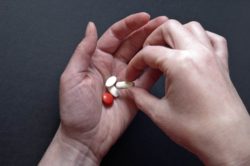 Stevens-Johnson Syndrome Causes
Stevens-Johnson Syndrome Causes
Stevens-Johnson Syndrome may be caused by an allergic reaction to one of several common over the counter medications. People who have a weakened immune system due to HIV/AIDS, receiving an organ transplant, or with an autoimmune disease may be at increased risk of developing the condition in response to taking these medications. Additionally, people with a family history of Stevens-Johnson Syndrome may also be more likely to experience the disease.
Is Stevens Johnson Syndrome Common?
Happily, both Stevens-Johnson Syndrome and its more severe counterpart, toxic epidermal necrolysis, are extremely rare. The National Organization of Rare Diseases explains that SJS and toxic epidermal necrolysis occur in around one or two individuals in every 1,000,000 people of the general population.
Though Stevens-Johnson Syndrome can appear in any demographic, certain people are at higher risk for the condition. Older people are much more likely to develop the condition than young people. Women are more likely to develop SJS than men, but not by a great margin.
Additionally, some patients may have a predisposition for the condition, regardless of other demographics. People with predispositions for developing SJS are more at risk particularly if they experience an adverse reaction to a medication. Those patients who typically have difficulty processing medications properly may have an elevated risk of developing SJS than other people.
Though the reaction is a very serious one, it is not likely to recur. If thought to be related to a person’s use of a particular medication, the condition usually manifests the first time the patient uses the offending over the counter or prescription drug. In some cases, the condition may occur again if a patient uses the same drug that caused SJS in the first instance.
Which Over the Counter Drugs Have Been Linked to Stevens-Johnson Syndrome?
Drugs that have been linked to cases of Stevens-Johnson Syndrome include anti-gout medication allopurinol, some anti-seizure medications, some antipsychotics, antibacterial sulfonamides and antibiotics like Azithromycin, HIV treatment drugs, and even common pain relievers including acetaminophen, naproxen, and Advil/ibuprofen.
What to Do if You Have Purchased an At-Risk Over the Counter Drug
If you have purchased an over the counter medication linked to Stevens-Johnson Syndrome, you may want to consider your personal risk factors. Some genetic factors, including genetic conditions or race, may play a role in your risk level. Additionally, if you have a family history of Stevens-Johnson Syndrome or have suffered from the condition in the past, it may be best to avoid taking the connected drugs in the future.
If you need to take a medication that is known to have the potential to cause the reaction, it may be useful to be aware of the symptoms of Stevens-Johnson Syndrome in order to identify the condition. Early symptoms often include a fever, body aches, and a cough, similar to the flu. A red rash or blisters that may form on the skin or mucus membranes, peeling skin, drooling, and painful urination are also symptoms to call your doctor about.
Cases of Stevens Johnson Syndrome
In addition to over the counter medication, some prescription drugs may also cause Stevens Johnson Syndrome. According to one woman who almost died from the condition, she initially thought that what turned out to be Stevens Johnson Syndrome was simply a case of insect bites.
According to Bethan P, a young Irishwoman, her condition started out as a few blisters and cold sores, as well as a toothache. However, after reading about Stevens Johnson syndrome and realizing that it was listed as a potential reaction to an antidepressant medication she was taking, she went to the hospital. Due to the quick progression of her condition and the extent of blistering and rashes appearing on her skin, she became unable to eat or drink on her own. At this point, she was placed on a ventilator in intensive care.
“I was put into the ICU and onto a ventilator because I kept getting worse – my skin wasn’t as badly affected as my insides were, it was more my lungs and intestines which made my case so life-threatening,” she told The Irish Sun.
After five weeks in intensive care on the ventilator, Bethan was finally removed from the machine.
Although she recovered from the life-threatening condition, she suffered from severe complications. As her body burned itself up from the inside, she lost her hair and nails and eventually had to shave her head. She also suffers lasting damage to her lungs and her eyes. Her tear ducts were damaged by the condition, so she is unable to cry and must use artificial eye drops to keep her eye membranes moist.
Should You File a Stevens Johnson Syndrome Lawsuit?
If you have taken an over the counter medication linked to Stevens-Johnson Syndrome, or a prescribed medication like Lamictal, and have developed the condition, you may be able to file a lawsuit against the drug manufacturers for failing to adequately warn consumers of the risks associated with their product.
Victims who speak with an experienced attorney about their case may be able to pursue compensation for injuries, medical expenses, lost wages, and pain and suffering. Families of people who have died due to SJS complications may also be able to pursue compensation for wrongful death.
Join a Free Stevens Johnson Syndrome Symptoms & Toxic Epidermal Necrolysis Lawsuit Investigation
You may qualify for this investigation under the following circumstances:
- You or loved one took an over-the-counter or prescription drug that caused you to develop SJS or TEN;
- You or your loved one was diagnosed with SJS or TEN; and
- You or your loved one was hospitalized because of SJS or TEN.
You may be able to hold the drug company accountable by joining this Stevens Johnson Syndrome lawsuit investigation.
See if you qualify by filling out the form on this page.
ATTORNEY ADVERTISING
Top Class Actions is a Proud Member of the American Bar Association
LEGAL INFORMATION IS NOT LEGAL ADVICE
Top Class Actions Legal Statement
©2008 – 2026 Top Class Actions® LLC
Various Trademarks held by their respective owners
This website is not intended for viewing or usage by European Union citizens.
Get Help – It’s Free
Join a Free Stevens Johnson Syndrome Symptoms & Toxic Epidermal Necrolysis Lawsuit Investigation
If you qualify, an attorney will contact you to discuss the details of your potential case at no charge to you.
PLEASE NOTE: If you want to participate in this investigation, it is imperative that you reply to the law firm if they call or email you. Failing to do so may result in you not getting signed up as a client or getting you dropped as a client.
Oops! We could not locate your form.


